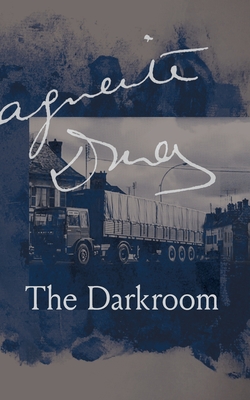The Darkroom

The Darkroom
THE DARKROOM contains the script for Duras' 1977 radically experimental film Le camion (The Truck), as well as four manifesto-like propositions in which Duras protests that most movies "beat the imagination to death" because they "are the same every time they are played." She also accuses the gatekeepers of traditional cinema of treating intelligence as if it were a "class phenomenon" and distinguishes her own approach: a cinema based on ideas and sensory experience. In the dialogue with Michelle Porte at the end of the book, Duras further describes her filmmaking style, discussing everything from her biography to her critique of Marxism. Much of the film consists of the sounds and images of a truck rumbling through an industrial landscape dotted with dilapidated, immigrant shantytowns. Periodically, the images of the truck are interrupted by cutaways of Duras and G rard Depardieu sitting in Duras' living room, reading from a script that includes a dialogue between a staunchly communist truck driver and an anonymous, ethnically-unidentifiable woman who stands in as an alter-ego for Duras and at the same time is a substitute for "everyone." Neither of the characters are ever shown on-screen. Via an afterimage effect, the juxtaposed voice-over text and cutaways help the film's audience members project their own images of the truck driver and hitchhiker onto the screen. The truck driver quickly decides the hitchhiker is "a reactionary" suffering from some kind of "mental disturbance." Using the "mad," uneducated woman (who, is, nevertheless, interested in everything from the position of the earth in the universe to politics to such august personalities as Proust, Corneille, and Marx), Duras criticizes the invasion of Prague by the Soviets in 1968 and its support by the French Communist Party. Between the images of the truck, juxtaposed voice-overs, and cutaways to Duras and Depardieu, the art of film becomes the art of opening audience members to the possibility of engaging multiple faculties-not only the visual and the aural, but also memory, imagination, and desire.
The Darkroom contains the script for Marguerite Duras' 1977 radically experimental film Le camion (The Truck), as well as four manifesto-like propositions in which Duras protests that most movies "beat the imagination to death" because they "are the same every time they are played." She also accuses the gatekeepers of traditional cinema of treating intelligence as if it were a "class
PRP: 102.30 Lei
Acesta este Prețul Recomandat de Producător. Prețul de vânzare al produsului este afișat mai jos.
92.07Lei
92.07Lei
102.30 LeiLivrare in 2-4 saptamani
Descrierea produsului
THE DARKROOM contains the script for Duras' 1977 radically experimental film Le camion (The Truck), as well as four manifesto-like propositions in which Duras protests that most movies "beat the imagination to death" because they "are the same every time they are played." She also accuses the gatekeepers of traditional cinema of treating intelligence as if it were a "class phenomenon" and distinguishes her own approach: a cinema based on ideas and sensory experience. In the dialogue with Michelle Porte at the end of the book, Duras further describes her filmmaking style, discussing everything from her biography to her critique of Marxism. Much of the film consists of the sounds and images of a truck rumbling through an industrial landscape dotted with dilapidated, immigrant shantytowns. Periodically, the images of the truck are interrupted by cutaways of Duras and G rard Depardieu sitting in Duras' living room, reading from a script that includes a dialogue between a staunchly communist truck driver and an anonymous, ethnically-unidentifiable woman who stands in as an alter-ego for Duras and at the same time is a substitute for "everyone." Neither of the characters are ever shown on-screen. Via an afterimage effect, the juxtaposed voice-over text and cutaways help the film's audience members project their own images of the truck driver and hitchhiker onto the screen. The truck driver quickly decides the hitchhiker is "a reactionary" suffering from some kind of "mental disturbance." Using the "mad," uneducated woman (who, is, nevertheless, interested in everything from the position of the earth in the universe to politics to such august personalities as Proust, Corneille, and Marx), Duras criticizes the invasion of Prague by the Soviets in 1968 and its support by the French Communist Party. Between the images of the truck, juxtaposed voice-overs, and cutaways to Duras and Depardieu, the art of film becomes the art of opening audience members to the possibility of engaging multiple faculties-not only the visual and the aural, but also memory, imagination, and desire.
The Darkroom contains the script for Marguerite Duras' 1977 radically experimental film Le camion (The Truck), as well as four manifesto-like propositions in which Duras protests that most movies "beat the imagination to death" because they "are the same every time they are played." She also accuses the gatekeepers of traditional cinema of treating intelligence as if it were a "class
Detaliile produsului











